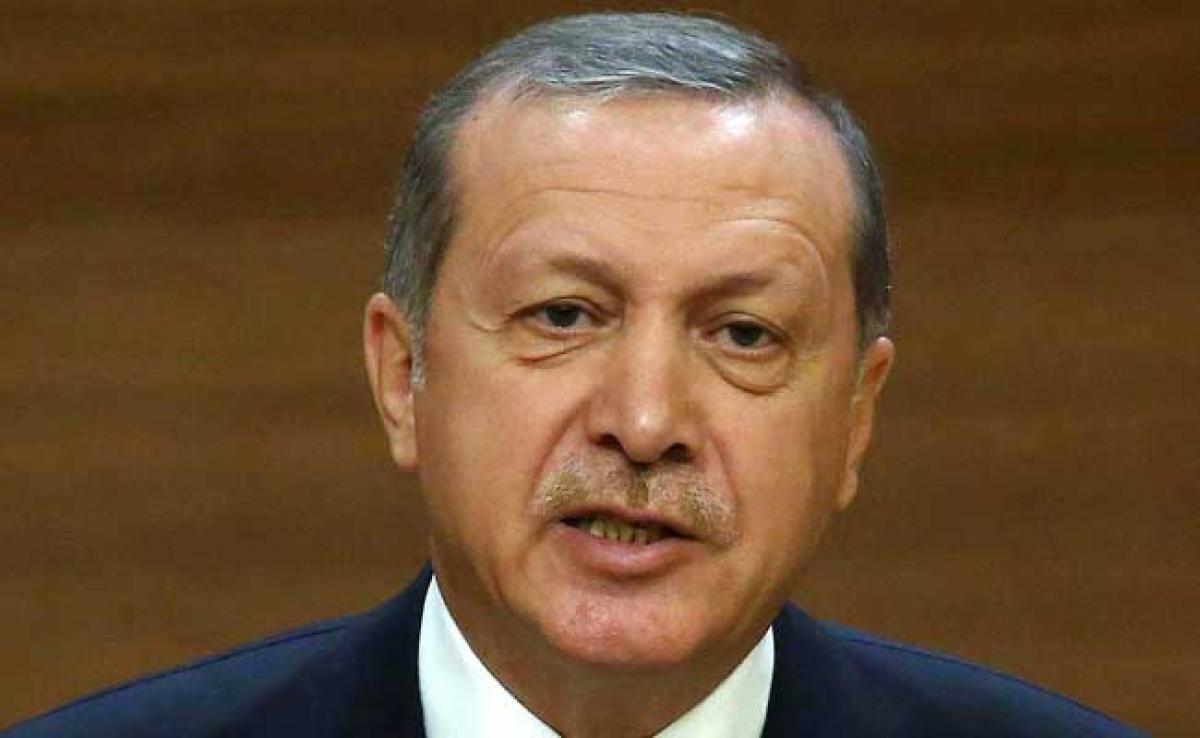Live
- Skill enhancement session organised for school teachers
- Tribal Ashram school girl students fall sick again
- Grand finale of Innovation marathon begins at IIT Tirupati
- Ensure no inconvenience to bus passengers: MLA
- Being overweight surpasses smoking as Australia's leading health risk
- Rush of Devotees at Tirumala normal, to take six hours for darshans
- Thiruvannamalai turns a major revenue earner for RTC
- Development works in Warangal to take off on war-footing: Ponguleti
- Great day for America: Trump welcomes FBI chief's resignation announcement
- SAAP chief for bringing hi-tech into sports
Just In

x
Highlights
Less than five months after the last legislative elections, Turks on November 1 will vote again in one of the biggest gambles of President Recep Tayyip Erdogan\'s political career.
Less than five months after the last legislative elections, Turks on November 1 will vote again in one of the biggest gambles of President Recep Tayyip Erdogan's political career.
But the outcome of the snap election, analysts say, risks being exactly the same as in the last polls on June 7.
This would be bad news for Erdogan, who wants the ruling Justice and Development Party (AKP) he co-founded to win back the overall majority it held since first coming to power in 2002, but lost at the last polls.
"In the last few weeks there has been no fundamental change, no change that would enable the AKP to gain to become a single-party government," said Nigar Goksel, senior Turkey analyst with the International Crisis Group (ICG) in Istanbul.
"We could still be in the same stalemate as before. But a lot could still change," she added.
Ever since the June 7 election dealt the biggest-ever blow at the ballot box to Erdogan and the Islamic-rooted AKP, the pugnacious Turkish strongman appears to have had his heart set on repeat polls.
He belittled the idea of a coalition, promptly called the repeat election once coalition talks broke down and has left Turkish voters in little doubt over who they should back on November 1.
Erdogan has his eyes not just on a simple majority, but on a three-fifths majority that would allow the AKP to call a referendum on his dream of changing the constitution to create a presidential system that he would head.
'Risk of political chaos'
The AKP polled just under 41 percent on June 7, well down on its 2011 result of just under 50 percent, with any chance of winning a majority stymied by the strong performance of the fourth-placed pro-Kurdish Peoples' Democratic Party (HDP).
Critics have accused Erdogan of launching a cross-border military operation against the Kurdistan Workers' Party (PKK) with the aim of discrediting the HDP, which he accuses of being a front for the outlawed Kurdish militants.
But even as government media claim 943 PKK militants have been killed in a relentless air campaign, polls are so far not showing any radical change in voters' intentions.
According to the latest survey by the respected Metropoll group, the AKP would win 41.7 percent of the vote and the HDP increase its share to 14.7 percent.
"As of today, it seems that the snap elections will not produce a very different political picture from June 7," said Metropoll's chairman Ozer Sencar.
But with Erdogan -- who has made no-holds-barred political combat his trademark -- showing no sign of compromise, Turkey risks being stuck in a prolonged impasse.
The president has made clear his distaste for coalitions and wants the AKP to return to power alone to carry out a transformation of the country's infrastructure ahead of the 100th anniversary in 2023 of the foundation of modern Turkey.
Meanwhile the AKP's most natural partner -- the third-placed Nationalist Movement Party (MHP) -- is out of the picture as its stubborn leader Devlet Bahceli refuses to countenance a coalition.
'Risk of political chaos'
Erdogan, who erved as premier for 11 years, became president a year ago on August 28, 2014 in the first ever direct election for a Turkish head of state, and has sought to revamp the office since.
For the first time, Turkey now has two democratically-elected centres of power -- the president and the parliament -- and this lies at the heart of the current standoff.
"The prospects after November 1 may just amount to more of the same: a democratically-elected president confronted with a democratically-expressed 'No' to his executive presidency ambition," said Marc Pierini, a visiting scholar at Carnegie Europe.
"Accepting, or not, this dead-end will define the political climate in Turkey for the months to come. There is indeed a real risk of political chaos."
Analysts caution that a lot could still change, with the Turkish authorities stepping up the pressure on the HDP and arresting several of its mayors on charges of supporting "self-rule" in the southeast.
Prime Minister Ahmet Davutoglu has now, in line with the constitution, formed an interim government to rule the country ahead of the elections, including two representatives of the HDP.
But the AKP scored a major coup as MHP MP Tugrul Turkes -- the son of the party's founder -- defied the usually cast-iron party line to take part in the caretaker cabinet, leaving the nationalist leader Bahceli apoplectic with rage.
"We don't have to wait long -- in two months time we will see if Davutoglu and Erdogan's tactics have proved successful," wrote commentator Murat Yetkin for the Radikal online newspaper.

Next Story
More Stories
ADVERTISEMENT
© 2024 Hyderabad Media House Limited/The Hans India. All rights reserved. Powered by hocalwire.com







